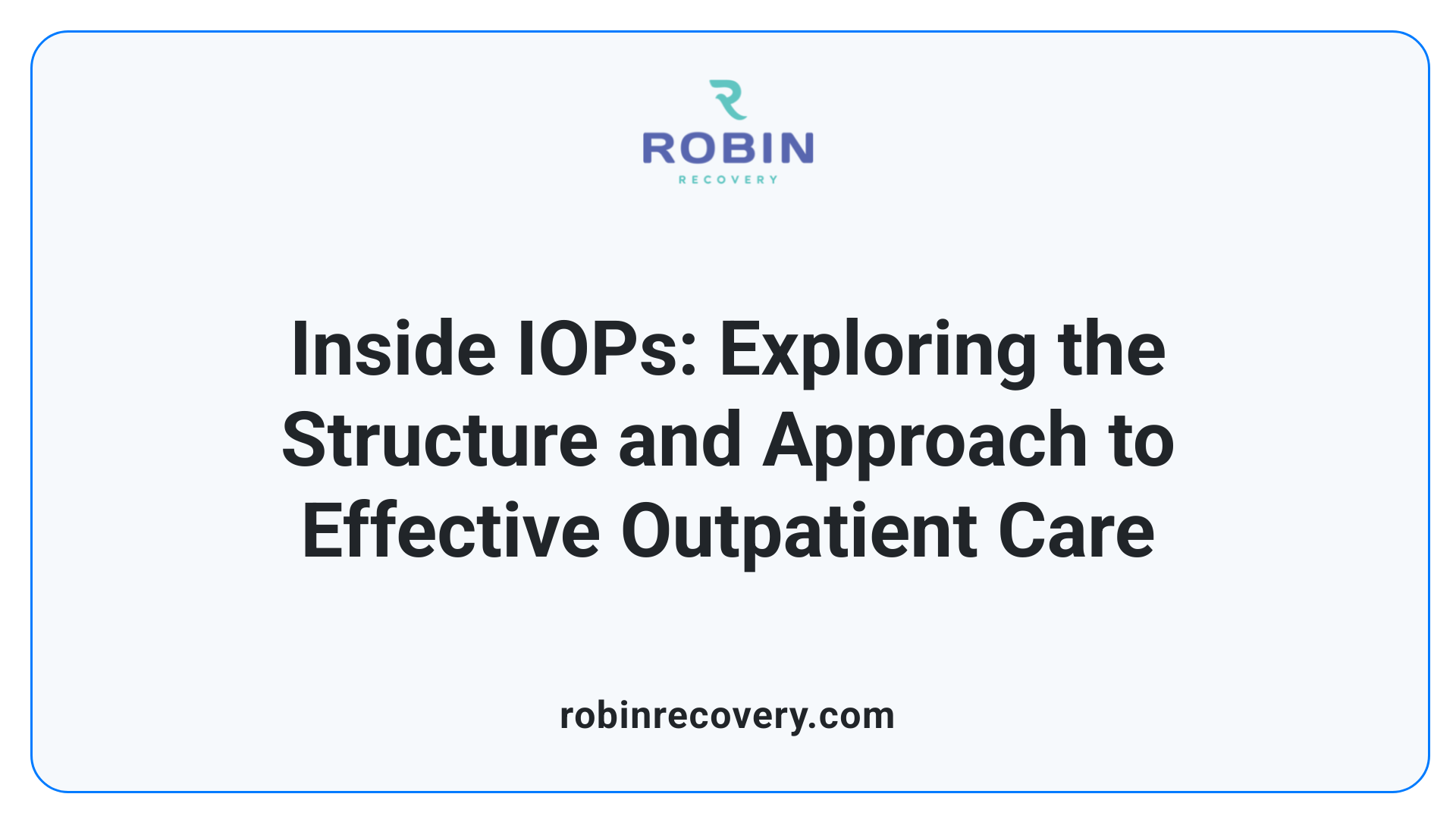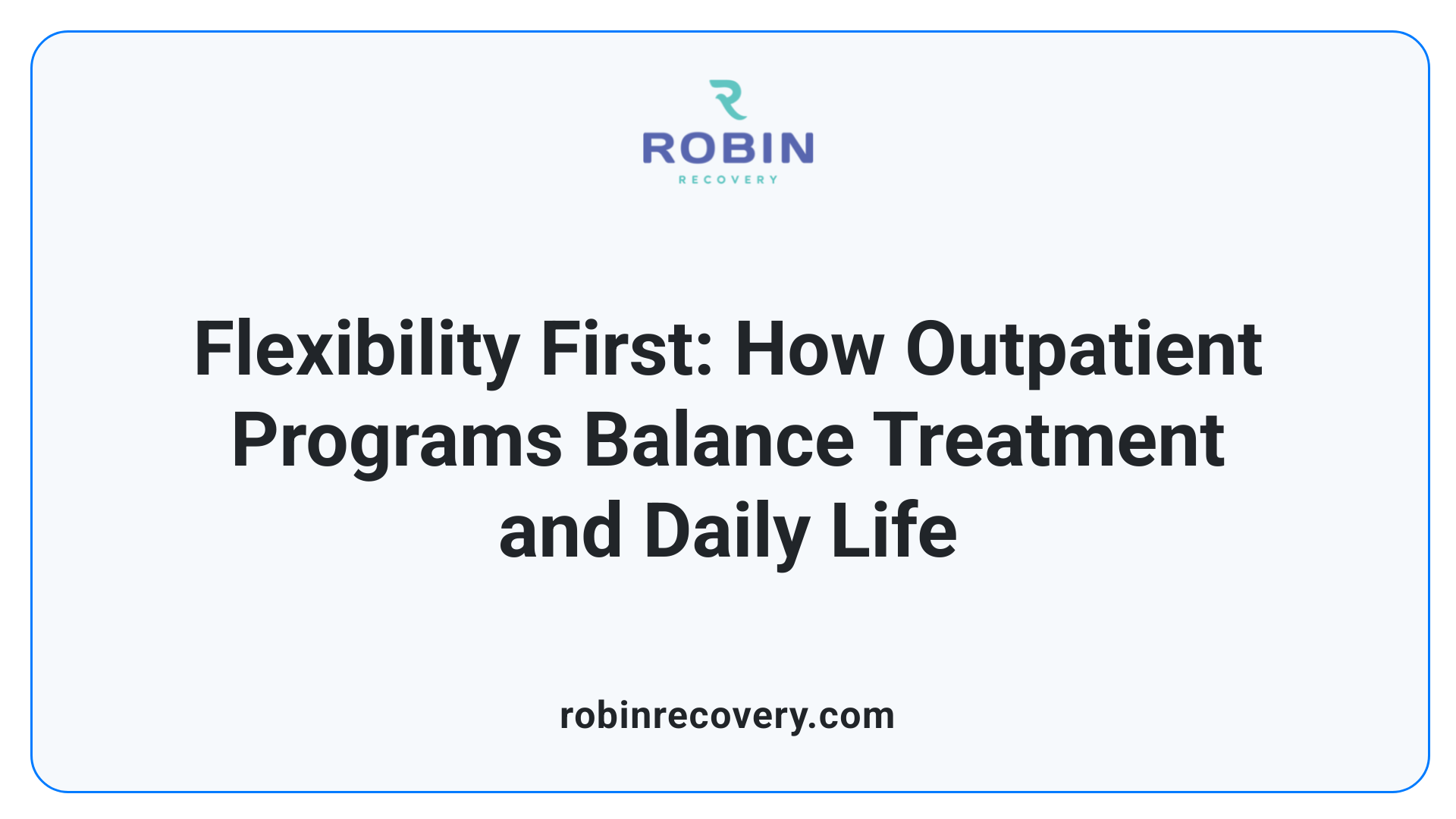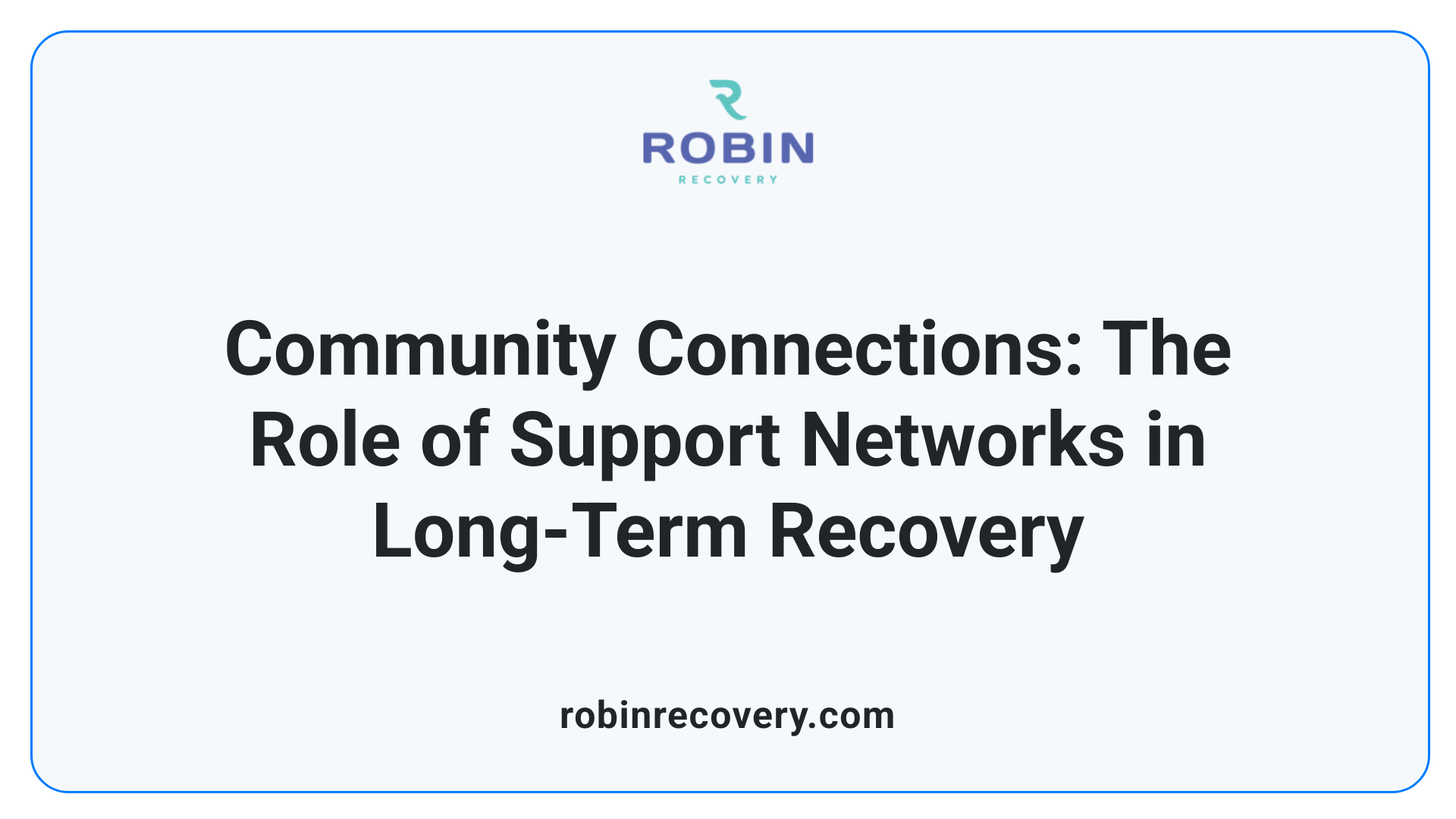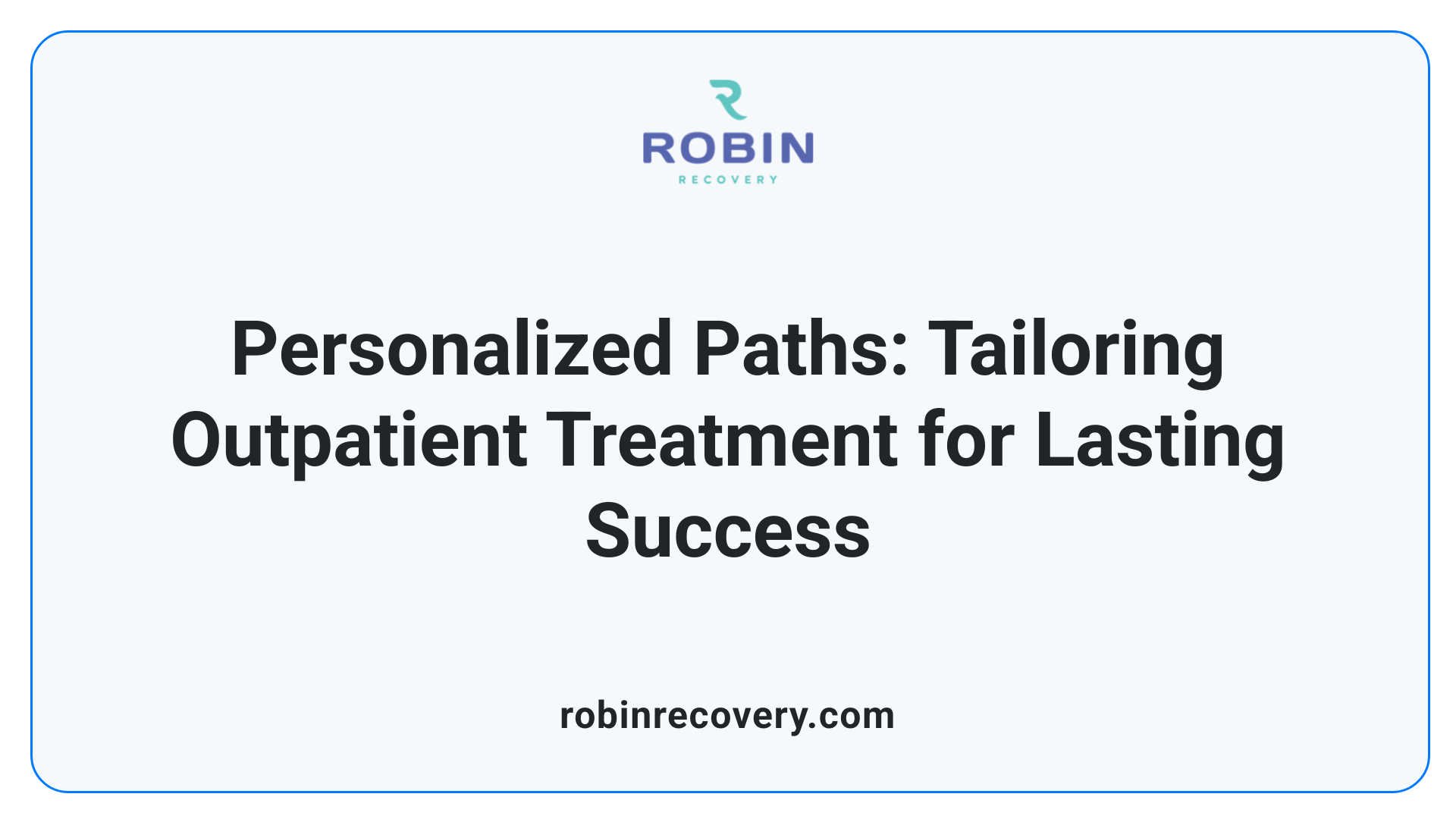How Intensive Outpatient Programs Support Work-Life Balance During Recovery

Introduction to IOPs and Their Relevance in Modern Recovery
Intensive Outpatient Programs (IOPs) have emerged as a flexible, effective intervention for individuals navigating recovery from substance use or mental health issues while balancing their professional and personal responsibilities. Unlike residential treatments, IOPs enable participants to receive comprehensive care without disrupting their daily routines, making them especially suitable for working individuals and family caregivers. This article explores how IOPs facilitate work-life integration and contribute to long-term stability by providing personalized, accessible, and holistic treatment options.
Understanding the Structure and Approach of IOPs

What is an intensive outpatient program (IOP) and how does it support work-life balance during recovery?
An IOP is a structured treatment program designed to help individuals recover from mental health issues and substance use disorders while continuing their daily routines. Typically involving three to five hours of therapy three to five days a week, IOPs include face-to-face or virtual sessions like individual counseling, group therapy, psychoeducation, and holistic approaches such as mindfulness and yoga.
The flexible schedule allows participants to maintain employment, manage family responsibilities, and engage in social activities, making recovery more sustainable and less disruptive. Effective time management, open communication with employers, and self-care routines support this balance.
Peer support is also emphasized through community groups and family involvement, reinforcing ongoing recovery outside formal sessions. Overall, IOPs serve as a bridge, providing intensive help without requiring hospitalization, thus enabling individuals to stay engaged with their personal and professional lives during treatment.
What are the components of IOPs like therapy, education, peer support?
IOPs consist of multiple interconnected components that promote a holistic approach to recovery:
- Individual Therapy: Personalized sessions focusing on coping strategies and personalized progress.
- Group Therapy: Facilitates peer interaction, shared experiences, and collective problem-solving.
- Family Involvement: Family therapy sessions strengthen support systems.
- Educational Workshops: Inform participants about disease processes, relapse prevention, and lifestyle changes.
- Holistic Therapies: Include mindfulness, yoga, nutrition education, and physical activity to support overall well-being.
- Medication Management: When necessary, medications are monitored and managed by healthcare professionals.
What evidence-based practices are used in IOPs such as CBT and Motivational Interviewing?
Treatment in IOPs often incorporates evidence-based approaches known for their effectiveness:
Practice Description Benefits Cognitive-Behavioral Therapy (CBT) Focuses on identifying and changing negative thought patterns and behaviors Helps develop coping skills and prevents relapse Motivational Interviewing Enhances intrinsic motivation to change behaviors through empathetic dialogue Encourages commitment to recovery and reduces ambivalence Dialectical Behavior Therapy (DBT) Emphasizes emotional regulation and interpersonal effectiveness Particularly useful for co-occurring disorders
These techniques are tailored to individual needs, ensuring that each participant receives personalized, effective treatment that promotes lasting recovery while managing daily responsibilities.
Flexibility as the Cornerstone of Successful Outpatient Treatment

How do IOPs facilitate maintaining daily responsibilities such as work and family commitments?
Intensive Outpatient Programs (IOPs) are specifically designed to help individuals balance their recovery with ongoing personal responsibilities. The flexibility built into IOPs is a major factor in their effectiveness for busy adults.
One of the main features of IOPs is their flexible scheduling. Many programs offer evening, weekend, or virtual sessions that can fit into diverse routines. This allows participants to attend therapy and support group meetings without missing work or neglecting family duties.
Personalization of treatment plans is another critical aspect. Healthcare teams work with individuals to create schedules that align with their work hours and family commitments. For example, some may attend evening sessions after work, while others might opt for online therapy during lunch breaks or weekends.
Support from employers is also essential. Many workplaces are increasingly aware of mental health and substance use issues. With proper communication, staff can grant flexible hours, remote work options, or reduced workloads during treatment periods. Legal protections such as the Family Medical Leave Act (FMLA) and the Americans with Disabilities Act (ADA) often support employees in taking leave or receiving accommodations without fear of losing their jobs.
Effective time management and clear boundaries are crucial strategies in balancing work and recovery. Planning daily routines, setting realistic goals, and maintaining open communication with all involved parties—employers, family members, and healthcare providers—help ensure that recovery efforts do not interfere with professional and personal life.
Support systems from family and peers reinforce accountability and emotional resilience. Incorporating stress management techniques and coping skills also minimizes work-related triggers, promoting a healthier balance.
Overall, IOPs empower individuals to pursue ongoing recovery while maintaining their work and family commitments. The combination of flexible scheduling, personalized plans, employer support, and legal protections makes outpatient treatment a viable and effective option for those committed to balancing their responsibilities with their health goals.
Structural Features and Support Systems Facilitating Long-Term Stability

What are the benefits and structural features of outpatient programs that support ongoing recovery and life balance?
Outpatient programs provide a flexible and comprehensive approach to recovery that allows individuals to maintain their daily routines. These programs typically include a combination of individual therapy, group counseling, and family therapy, forming the core of their structure.
One significant benefit is the adaptability in scheduling. Participants can attend therapy sessions in the evenings or on weekends, minimizing disruption to work and family responsibilities. This flexibility is crucial for long-term stability, enabling individuals to practice new skills in real-life contexts while managing their recovery.
Community and peer support are also integral elements. Connecting with others on similar journeys fosters a sense of belonging and accountability. Support groups, alumni networks, and community involvement encourage sustained engagement and provide ongoing encouragement beyond formal sessions.
Family involvement through counseling sessions helps to strengthen relationships and create a supportive home environment. Educating family members about the recovery process enhances understanding and reduces potential stressors or triggers in the home.
The structural features of outpatient programs, such as life skills training and coping strategies, prepare individuals to navigate real-world challenges effectively. These include managing triggers, reducing relapse risk, and balancing work, social, and personal life.
By integrating therapy, community, and family support, outpatient programs promote not only recovery but also personal growth and resilience. They support long-term stability by creating an environment conducive to continuous development and sustained well-being.
Program Component Description Purpose Individual Therapy One-on-one sessions tailored to personal needs Personal development and relapse prevention Group Counseling Peer led or facilitated group meetings Building community, support, and shared learning Family Therapy Involving loved ones in treatment Strengthening relationships and support systems Community Engagement Support groups, activities, alumni networks Ongoing encouragement and accountability Life Skills Workshops Training on coping, stress management, daily routines Enhancing real-world functioning
How do outpatient programs promote long-term recovery?
By integrating these features—flexible scheduling, peer support, family involvement, and practical skill-building—outpatient programs create a sustainable environment for recovery. They help individuals balance their responsibilities with ongoing treatment, reducing the risk of relapse, and fostering lasting personal growth.
Support Systems and Community Engagement in Recovery

What role do support systems within IOPs play in helping individuals manage their recovery alongside professional and personal life?
Support networks are a vital component of Intensive Outpatient Programs (IOPs), helping individuals juggle their recovery journey with everyday responsibilities. These systems include peer support groups, family participation, and guidance from mental health professionals.
Peer support groups offer a platform for shared experiences, fostering a sense of belonging and mutual encouragement. Connecting with others facing similar challenges provides motivation and accountability, crucial for maintaining progress.
Family involvement is equally important. Family therapy sessions create a safe space for open communication, allowing loved ones to understand the recovery process and learn how to provide effective emotional and practical support. This helps strengthen relationships and builds a supportive home environment.
Professional guidance from therapists and recovery coaches offers tailored strategies to cope with triggers and setbacks. These experts help clients navigate challenges by setting realistic goals, developing resilience, and reinforcing healthy habits.
Community resources, such as local support groups, wellness activities, and educational programs, further solidify long-term stability. Being engaged in community initiatives offers additional outlets for social interaction and personal growth.
Altogether, these support systems create a comprehensive safety net that sustains recovery while allowing individuals to uphold their work and family commitments. They empower people to build enduring habits for health and well-being beyond structured treatment.
Customizing Treatment for Sustainable Recovery

How are outpatient treatment plans designed to support work-life integration during recovery?
Outpatient treatment plans are structured carefully to help individuals balance their recovery journey with daily responsibilities such as work and family commitments. Central to this approach is flexible scheduling. Many programs, especially Intensive Outpatient Programs (IOPs), offer sessions in the evenings or on weekends, making it easier for participants to maintain their professional and personal lives.
A personalized treatment approach is key. Each plan typically includes a mix of therapy sessions—such as individual counseling, group therapy, and family involvement—and educational workshops tailored to individual needs and circumstances. This customization ensures that treatment addresses specific challenges faced by each person.
Support systems are reinforced through family education, peer interactions, and ongoing coaching. These elements build resilience and provide encouragement outside of formal sessions. In addition, developing coping skills enables individuals to manage stress and prevent relapse in real-world settings.
Legal protections play an important role as well. Laws like the Family Medical Leave Act (FMLA) and the Americans with Disabilities Act (ADA) help safeguard employment rights and facilitate workplace accommodations. These support mechanisms reduce work-related stress and stigma, helping individuals focus on recovery without fear of job loss.
Overall, outpatient programs are designed to be flexible, supportive, and comprehensive, fostering an environment where individuals can pursue their recovery goals while fulfilling their work and family obligations.
The Significance of Outpatient Programs in Long-Term Recovery
Why are outpatient programs important for long-term recovery and overall life balance?
Outpatient programs play a vital role in supporting long-lasting recovery by offering flexible and personalized treatment options. They enable individuals to maintain their usual daily routines, such as work, family responsibilities, and social activities, while accessing ongoing therapy and support.
These programs typically include a combination of individual counseling, group therapy, family involvement, and education about mental health and substance use. This comprehensive approach helps individuals develop healthy habits, acquire coping skills, and build supportive relationships that are crucial for staying sober.
A significant benefit of outpatient care is its adaptability; many programs offer evening, weekend, or virtual sessions, reducing barriers related to scheduling and transportation. This structure facilitates sustained engagement in recovery efforts, which is essential for preventing relapse.
Extended outpatient treatment—often lasting three months or more—allows for continuous reinforcement of recovery skills. It helps individuals navigate life's stressors and triggers with ongoing support, boosting their confidence in maintaining sobriety and balance.
How does ongoing outpatient care contribute to long-term stability?
Long-term outpatient care emphasizes relapse prevention by providing regular check-ins, support groups, and access to mental health resources. These elements foster accountability and help identify early signs of relapse.
Supporting evidence suggests that individuals involved in extended outpatient programs are more likely to sustain their recovery, thanks to the ongoing guidance and community connection they receive.
It also promotes overall life balance by encouraging self-care, stress management, and open communication with loved ones. These practices contribute to healthier routines and relationships, which are critical for long-term success.
Practical strategies for maintaining recovery while managing life commitments
- Building healthy habits such as regular exercise, balanced nutrition, and mindfulness.
- Engaging in continuous therapy and support groups.
- Setting boundaries and managing stress through effective time management.
- Utilizing community resources and family support systems.
- Prioritizing self-care and maintaining open communication with employers and loved ones to accommodate recovery needs.
Ultimately, outpatient programs are a cornerstone of sustainable recovery, helping individuals integrate their well-being into daily life while pursuing personal and professional goals.
Empowering Recovery Through Flexibility and Support
Intensive Outpatient Programs (IOPs) stand out as a vital component of contemporary recovery strategies, effectively bridging the gap between inpatient treatment and independent living. Their core strength lies in flexibility—adapting schedules, incorporating personalized care, and fostering support systems—all of which are essential for maintaining work-life balance. By enabling individuals to continue their professional and personal roles, IOPs not only support immediate recovery goals but also lay the foundation for long-term stability and health. As more programs embrace innovation through virtual options and community engagement, the potential for sustainable recovery and enhanced quality of life becomes increasingly attainable for countless individuals. Ultimately, IOPs serve as an empowering resource, helping recoverers integrate wellness seamlessly into their diverse life responsibilities.
References
- Balancing Work, Family, and Recovery Through Intensive Outpatient ...
- How to Find Work-life Balance During Outpatient Treatment?
- PHP & IOP: Balancing Work, Life, & Mental Health Treatment
- Managing Your Recovery in an Intensive Outpatient Program While ...
- How IOP and PHP Work Together to Ensure Long-Term Recovery ...
- Balancing Work & Recovery: Tips for Professionals - Thrive Treatment
- What Happens in Intensive Outpatient Programs (IOPs)
- How Do Intensive Outpatient Programs (IOPs) Work?
- Evenings and Weekends: How Intensive Outpatient Programs Fit ...
- How to Balance Work and an IOP - QuickSilver Counseling Center
